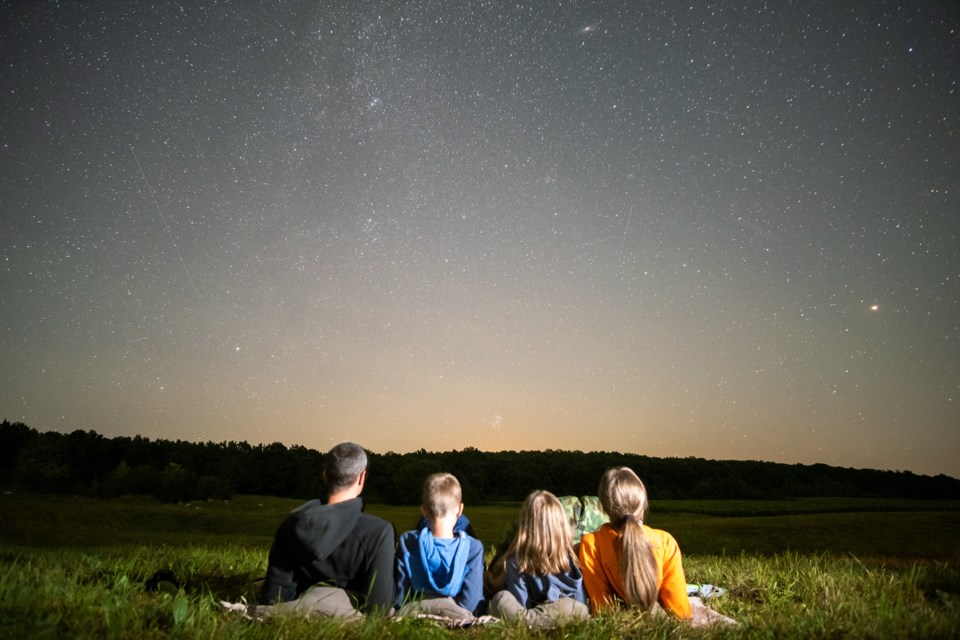If you enjoy taking in the annual Perseid meteor shower, it has become even easier to do, thanks to the City of Greater Sudbury.
This year the City completed the replacement of all of our streetlights, which are now downward-facing, night-sky-friendly LEDs. In addition to energy savings and reductions in greenhouse gas emissions, these streetlights help everyone get a better view of the meteor showers and also protect migrating birds and nocturnal animals like bats, owls and nighthawks.
The Perseid meteor shower
Every year the peak of the Perseid meteor shower happens at a slightly different time; this year it’s expected to occur this week, between Wednesday, August 11th and Friday, August 13th.
“There are several meteor showers each year but the Perseid meteor shower is considered the best known and most popular. Not only because it occurs from mid-July to late August when the weather is perfect for sitting out and watching the stars, but for a number of other reasons too,” says Jennifer Babin-Fenske, Coordinator of EarthCare Sudbury Initiatives.
“This meteor shower happens throughout the sky in Canada, instead of on just one horizon. It is very active with 50-100 meteors per hour during the peak and the meteors are bright with long tails. You can start to see them around 10 p.m. so you don’t have to wait until a few hours before dawn, when some of the other meteor showers are most active,” she says.
To view them, areas without too many lights and with less light pollution are best. Greater Sudbury has many open areas that would work: backyards, soccer fields, hillsides, fields and farmland. “Luckily, we are working on reducing our light pollution in the community and installing more and more dark-sky-friendly lighting,” she says.
Babin-Fenske makes it a priority to take her children, 10 and 13, out to enjoy the night sky. It’s important to her that the next generation appreciates nature and being outdoors in the fresh air, even if sometimes they just bring their lawn chairs out into the backyard. They’ll try to count the meteors, making a competition out of it sometimes.
Light pollution
Artificial light has several negative effects. Birds, bats, insects and all kinds of wildlife need dark sky-friendly lighting; too much light adversely affects their hunting, feeding and sleep patterns. It even affects migration, disorienting birds and causing them to change their route.
In the city you might look up and see the Big Dipper, yet compare that to when you’re a bit further outside a main centre, camping or in the forest. You’ll see so many more stars because there just isn’t the same level of light pollution.
City streetlights
Cities all across Canada are working on reducing their light pollution and installing dark-sky-friendly lighting. Many other cities in the province—places like Kingston, Markham, Mississauga, North Bay and Windsor—have already switched theirs over.
Sajeev Shivshankaran, the City of Greater Sudbury’s Energy & Facilities Engineer, managed the project of replacing 11,288 streetlights with cobra head-style fixtures that contain directional LED lighting, as well as 100 special decorative lights for the City’s downtown core.
“After using the old lights for so many years, there were many other issues, including wiring faults. It was not up to code, so we not only updated we also upgraded the system,” he says. “The lighting and the quality of light is better than before. Longevity is also promised on this.”
The budget approved for the endeavour was $6.15 million. At the time, the Independent Electricity System Operator was offering $560,000 in incentives—incentives that were about to expire—which helped offset some of the costs. The company that did the work for the City was arranged through the Association of Municipalities of Ontario (AMO), which helped ensure very competitive costs.
Shivshankaran estimates that as a result of the swap the City will reduce its energy consumption by 7.4 million kilowatt hours, which represents 61% of the previous year. They will also save up to 41% in costs compared to the year before, resulting in over $1 million per year in operational savings alone. He is particularly proud of the effect this will have on global greenhouse gas emissions.
“This is a great news story for Sudbury,” he says. “The City has committed to net-zero emissions by 2050. We have also declared a climate emergency. Because of that we have a Community Energy and Emissions Plan which we are following to reach this goal.”
Another benefit? Less maintenance. High-pressure sodium (HPS) bulbs, the kind used previously, have to be changed at least once every five years. Now with no actual bulbs and light-emitting diodes being used, each unit lasts up to 20 years.
Dark-sky compliance requires not just reducing the amount of light pollution but thinking about the directional aspect. Cobra head light fixtures help by only illuminating what lies directly below and the LEDs themselves are highly directional.
The City also made sure to follow and to meet RP-8 requirements, a North American standard for roadway lighting and associated systems.
What residents can do
Other lights in our community also contribute to brightening the night sky, including parking lots, driveways, private residential and commercial properties. When replacing or installing outdoor lights, homeowners should make sure to use LEDs. This will help reduce energy costs and contribute towards the City’s net-zero emissions goal for 2050.
Another step you can take is to install downward-facing directional lighting; look for lights that are certified by the International Dark-Sky Association. Dark-sky lighting helps reduce wasted light, shadow contrast and glare, which in turn increases safety and security.
Learn how you can help reduce light pollution. For more information, visit EarthCare Sudbury.
